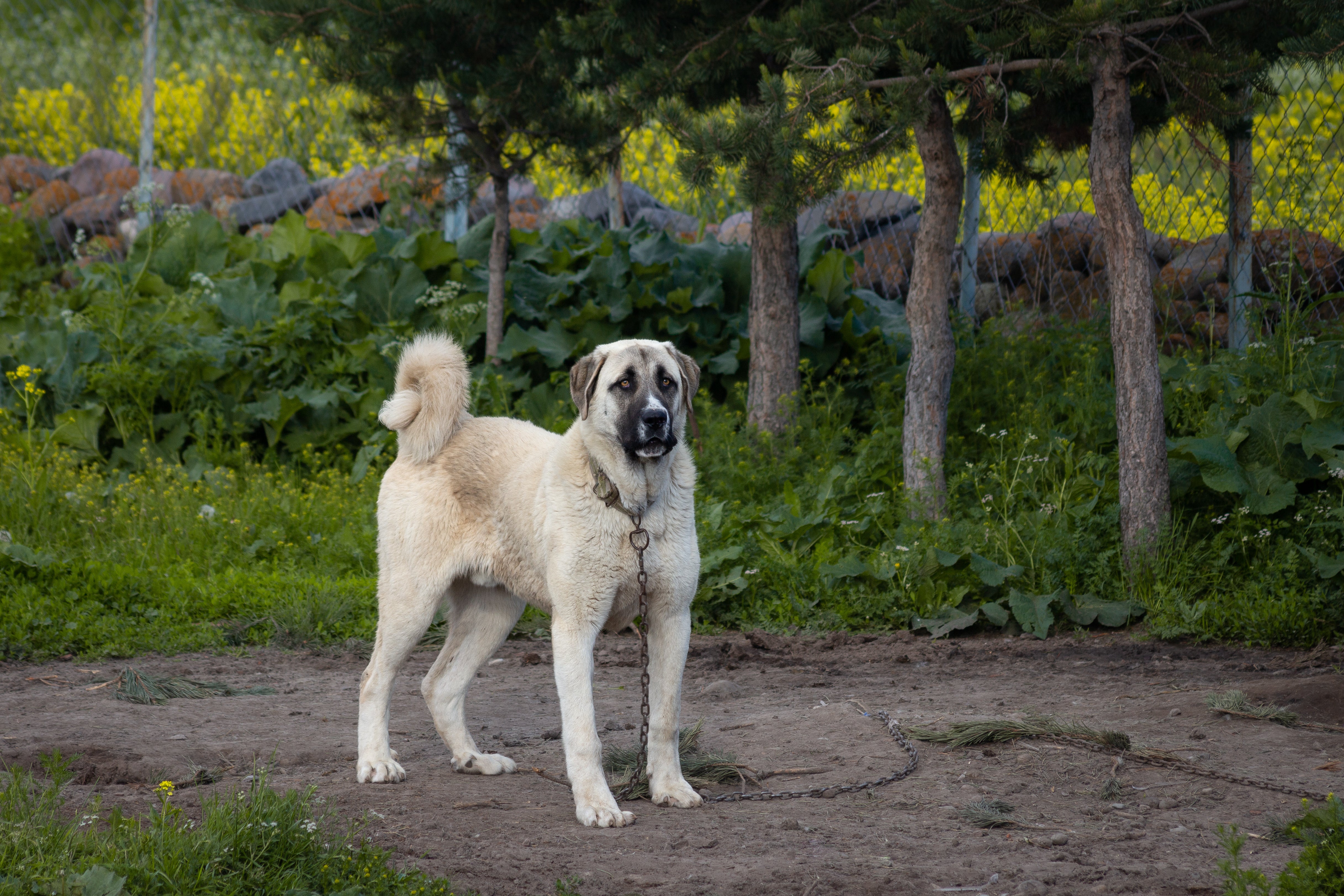Turkish Kangal
If you like a supersized dog with an impressive history of protecting livestock, the Turkish Kangal dog might be for you. They have short, thick, and dense coats with a waterproof and windproof undercoat designed to protect them from harsh weather conditions. They can be seen as gentle giants if trained properly.
Breed characteristics carousel
Learn More
Need to Know
- Dogs suitable for experienced owners
- Extra training required
- Generally healthy breed
- Enjoys active walks
- Minimal drool
- Requires frequent brushing
- Generally quiet dog
- Barks, alerts, and may be physically protective/suspicious of visitors
- Might not like other dogs and may need additional training to live with other pets
- May need additional supervision to live with children
- Needs a large yard, preferably in a more rural area
- Can be left alone occasionally with training

Personality
Think of the Turkish Kangal dog breed is like a wisened older sibling: they can be powerful, protective, and calm…until they’re not. They’re smart and independent thinkers, capable of making decisions without the input of a human handler, but they must be trained to know how to act around children, other pets, livestock, or anyone else they might perceive as a threat.
The Kangal dog of Turkey is a livestock guardian breed, ready to protect and alert a flock to danger. Named after the Central Anatolian town of Kangal in the Sivas Province of Turkey, these dogs are thought to have been brought from Central Asia by nomadic Turks. For a long time, the Kangal and another similar breed, the Akbash, were considered to be the Anatolian Shepherd Dog, but now they are two distinct breeds.
You’ll need to be willing to put in the time to train a Turkish Kangal properly. While generally calm, they can be demanding dogs that take time, money, and energy. They can be kept as family dogs if socialized carefully and properly. Like a Virgo, they prefer their small circle to a bevy of casual visitors.
Don’t be fooled by their size: the Kangal is an athletic dog, capable of reaching speeds of up to 30 miles per hour or more in short bursts when fit and lean. You should plan to exercise them for at least two hours per day, including running free. They likely won’t enjoy training, but they do like mental exercises like games and puzzles.
The more space the better inside and out of the house to accommodate a Turkish Kangal. They can be clumsy and weigh over 100 pounds, so they’ll need plenty of room to feel at ease. Outside, it’s ideal to have space for them to run free in a fenced-in yard or farm.
The Turkish Kangal dog doesn’t need a lot of grooming maintenance. A good brush through will take care of their coat. A full bath with a dog this size can be a large undertaking, however. You might want to get them professionally groomed, which can be costly.
Like some teenagers, Turkish Kangals can be slow to mature, although they have an underlying intelligence. Independent yet calm, these dogs have strong bonds with their owners when based on kindness, consistency, and patience. “Gentle parenting” should be used, not bullying or attempts to force them into submission. They do well with reinforcement. You’ll want your Kangal to believe you to be the most fun, safe, and interesting person to be around if they are to do well as a pet. They should be socialized as early as possible so that they are compliant companions.
Turkish Kangals aren’t at the top of any family-friendly breed list, but they can be good family dogs if trained and socialized properly from a young age. They can be fairly aloof in personality and clumsy in their bodies. They are likely weary of visitors, preferring their close circle, and can take several years to mature. They don’t make good dogs for families with small children due to their training requirements and their large size.
The cost of a Turkish Kangal from a breeder is significantly more than the cost of adopting one from a local shelter or rescue. The adoption fee usually covers additional items such as spaying or neutering, vaccines, and microchipping.

Learn more about feeding and caring for your Turkish Kangal on Purina.
Did you know?
- Kangal dogs, once Anatolian sheep guardians, now star in Namibia. Donated by the Cheetah Conservation Fund, these brave pups have slashed livestock losses from cheetahs by 80% in 30 years.
